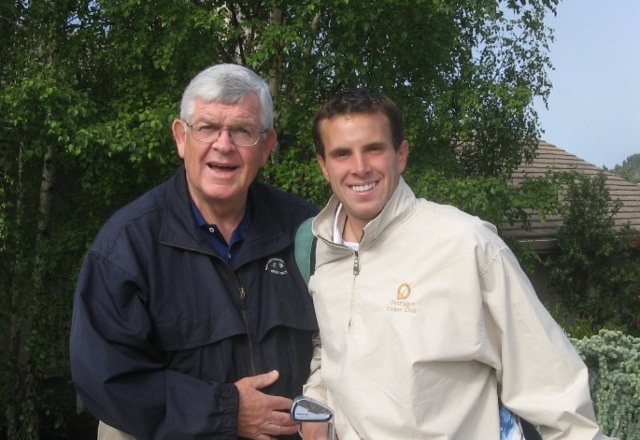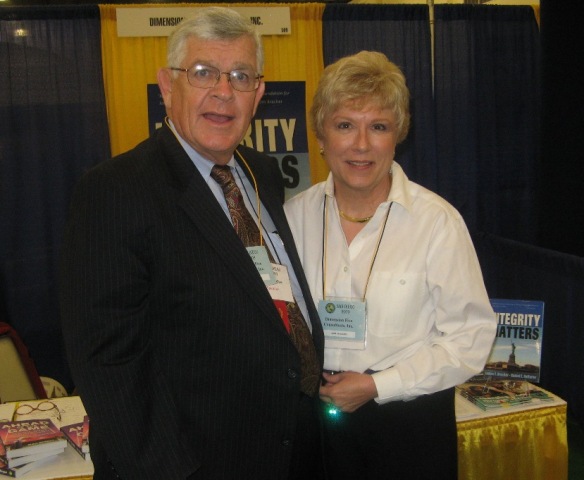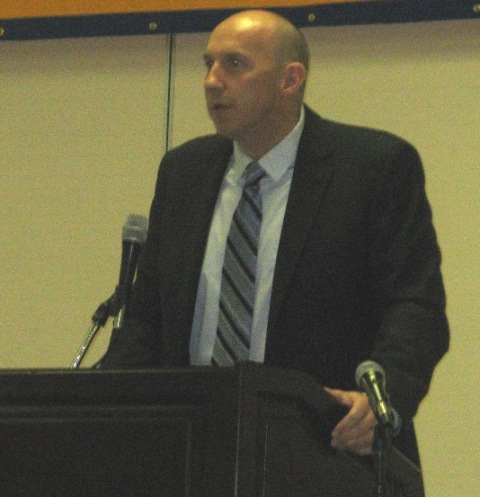Integrity Matters Broadcasts
May 8, 2009
Dear Friends of Executives-in-Residence,
Success is about combining intellect with interpersonal impact. When that combination is focused on quality and service to humanity, the results are stellar. Chances are quite good that our readers can identify individuals who have leveraged superior ideas (including processes) with a thoughtful operating style (working and relating well with others) to create lasting and positive impact in a variety of endeavors. Perhaps you would share such stories. We hope so.
In the meantime, here is an essay written by a 23-year-old friend of mine, Ben Zoller, who is now applying to law school. Once you read his perspective on life, it may inspire you to summarize your values in similar way. Ben is the son of a good friend, Bob Zoller, and the grandson of a one of my favorite people, now deceased, John Zoller. What Ben offers to us is a clear reminder that we all can learn about coping with life, conquering challenges and making sense of the events that sometimes overwhelm us.

Ben Zoller & Jim Bracher
Regardless of where we learn lessons for “coping” – we do need life-skills, with immediate and effective ways to put them into practice. Ben’s thoughts follow.
“Golf has provided me with the essential tools to survive in life. I will never know what lies around the corner, or for that matter, where the next shot will take me but I am confident that the disciplines and values I am carrying around in “my bag” will equip me to play the game of life.” Ben Zoller
Personal Statement of Benjamin Zoller –
(Introducing his personal values to law school admissions officers, in hopes of being accepted.)
The five basic needs for human survival have been defined as air, water, food, shelter and clothing. The psychologist Abraham Maslow developed the concept further with his theory of the Five Basic Levels of Needs: Physiological, security, love, self esteem and self actualization. In the family that I grew up in, there was a sixth basic level of need: Golf.
The game of golf was woven into the fabric of my existence before I was born. My grandfather was exposed to the game through tending the sheep that kept the grass cut on a local golf course in Ohio, after which he developed a passion for the game that he passed onto his children. My uncles, aunts, father and mother all play the game and are in one way or another professionally connected to it. Being around golf for them is as natural as breathing in and breathing out. It wasn’t until many years later that I clearly understood why the game of golf was such a fundamental component of not only our family life but life itself.
My formative years were content with helping out at a local pro shop picking up balls on the range, caddying, cleaning clubs and, after member hours were over, occasionally playing 9 or 18 holes. I never had much interest in actually playing golf and for many years rarely ever picked up a set of clubs. My freshman year in high school that all changed.
The high school I attended had a prominent golf team and I loved to compete in sports, especially a sport where our school was reputed to have one of the top teams in the state. I immediately assumed that I would be a natural and the sport would come easy to me. I was cut after the first tryout. Accepting this set back wasn’t easy and, determined to make the team the following year, golf became an obsession. Every afternoon was immersed in practicing, watching, reading countless “how to” books and learning the fundamentals of golf. I had developed a mindset that I was going to make the team and begin the pursuit of a professional career in golf. My sophomore year I earned a spot on the junior varsity team and eventually improved enough to play varsity my junior and senior years. Now playing regularly on the team, a level of confidence developed and I was certain that college golf was the next step in my evolving career.
After graduation, I enrolled in school at the University of Denver. At the time, there was never a doubt that I could easily make their golf team and would earn a spot through the annual “walk on” tournament. It would be that simple. For the next three years, I turned in the best “walk on” tournament scores but each time learned that their roster was already full. Disappointment, frustration and discouragement were frequent companions when it came to my attempts to be selected for the University of Denver golf team. Nonetheless, I continued to practice, perfect my game and come to the realization that a career in professional golf was not as critical as what I was learning about myself in the process. Goals in life are essential, but often it is the journey between setting a goal and reaching it that makes the difference.
Golf is a game of patience, integrity, honesty, perseverance, confidence, humility and an incredible commitment to plain old-fashioned hard work. It’s a game of problem solving, taking risks, using your imagination in tough situations, building on your strengths, working around your weaknesses and learning to shake off a bad hole and move forward with confidence to the next. Either you learn to manage the game or it will eventually manage you.
The great golfer Bobby Jones once said “Golf is the closest game to the game we call life. You get bad breaks from good shots; you get good breaks from bad shots – but you have to play the ball where it lies.” Golf, the sixth basic level of need, has provided me with the essential tools to survive in life. I will never know what lies around the corner, or for that matter, where the next shot will take me but I am confident that the disciplines and values I am carrying around in “my bag” will equip me to play the game of life.
These comments, along with some of my own research, helped to build a platform for my comments at the recent California State Athletic Directors Association, held a few weeks ago in San Diego, California. http://www.csada.org/files/Newsline.2009.02.pdf The title of my general session address: Integrity: On-Ramp to Sportsmanship and Success

Jane and Jim Bracher - Integrity Matters exhibit in San Diego

Hugh McCutcheon, Head Coach
USA Men’s Olympic Gold Medal
Volleyball Team – 2008 Beijing, China
Many colleagues have heard me say: “I don’t care nearly as much about what you think as about what you know.” The purpose of the sometimes stinging comment (to those who did not understand) was not a rejection of listening, which is critical, but a repudiation of passing along idle theories that had not been tested. And, the truth is that we don’t know for sure until we have tried, and it almost doesn’t matter whether we succeeded or failed, but it does matter that we invested the time to learn. Theory is interesting. Experience teaches.
This fellow pictured just above is Coach Hugh McCutcheon who knows what it means to prepare and win. He delivered a powerful message at the California State Athletic Directors Association meeting in San Diego. Yes, I did take notes when he spoke. None of his comments were theory because they emerged from what he and his team accomplished. What he shared was wisdom.
Here are nine reasons McCutcheon’s team won an Olympic Gold Medal, and how you and your colleagues can improve your performance – personally and professionally:
- Build a competitive advantage by out-preparing, out-competing and out-teaming.
- Team members suppress the personal – on and off the field of play.
- Articulate, communicate and internalize the only kind of vision that creates success, the one that demands being exceptional, first, the best and world class.
- Adversity is an opportunity to rise to the occasion, and penalizes finger-pointing.
- Marathons are not won by those who are “in the zone” - because we are only in the zone about 15% of the time and the victory belongs to those who, during the other 85% of the time are focused on discipline, sacrifice and hard work.
- Success comes from mental and physical engagement and it boils down to grinding, which means unrelenting focus on, mission-critical tasks.
- Masters of the craft are continuously working on getting better.
- Winners willingly support a culture of accountability that demands emotional intelligence.
- Winners are aware, in-tune and supportive of their colleagues – intellectually and interpersonally.
Life skills are learned, one lesson at a time, and depend on integrity (consistency) for constructive application. The best teaching always comes from a personal example.
Jim
James F. Bracher
Founder
Dimension Five Consultants, Inc.
Bracher Center for Integrity in Leadership
P.O. Box 22467
Carmel, California 93922
www.brachercenter.com
And at:
James F. (Jim) Bracher, Director
Executives in Residence
University Corporation at Monterey Bay
California State University Monterey Bay
100 Campus Center,
Building 201 - Suite 101
Seaside, California 93955
Phone: (831) 582-5015
Phone: direct: (831) 582-5038
(831) 582-5019 Fax
jfb2c@brachercenter.com